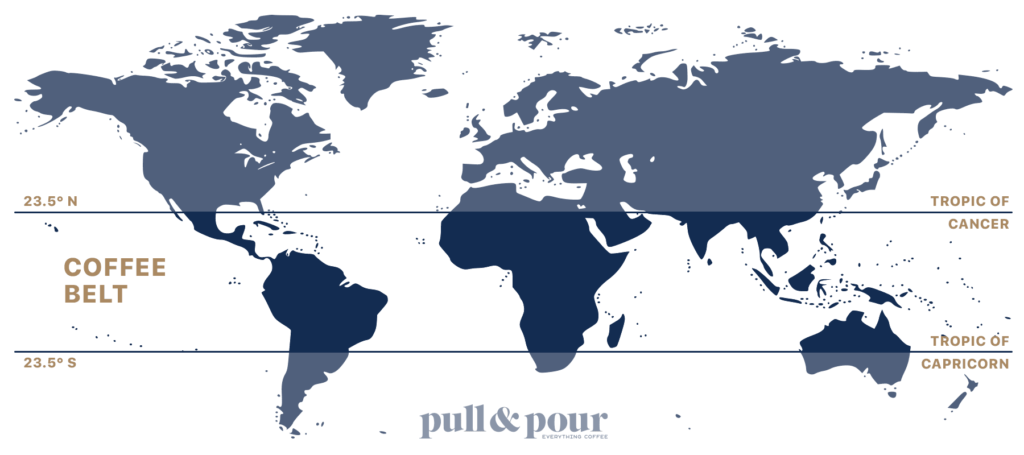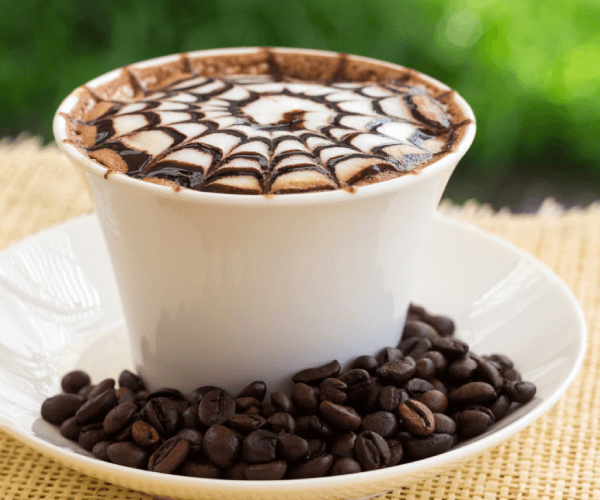
You may have come across the term specialty coffee either on social media or at your local coffee shop and you might have noticed that there is a certain hype about such coffees and that they might seem to be more expensive than a regular cup of coffee. Why is it so?
To help you understand what specialty coffee is all about I would like to break it into the following sections.
- What is specialty coffee?
- How is it different from regular coffee?
- Why is specialty coffee more expensive than commercial coffee?
Let’s start by answering the most basic question…
What is coffee?
Coffee is a seed (the coffee bean that you see, is actually a seed) that comes from the plant coffea1 and is generally grown in the tropical regions of the world.
Coffea is a genus of flowering plants in the family Rubiaceae. Coffea species are shrubs or small trees native to tropical and southern Africa and tropical Asia
There are over 120 species of coffee plant found around the world but most of these plants are not commercially viable to grow and cultivate. The coffee plant is a bush and the resultant coffee bean is actually the seed of the coffee cherry that grows on the plant.

The two most common species of the plant that are grown are Coffea Arabica (also known as Arabica) and Coffea Canephora (also known as Robusta). These two species alone account for over 95% of the commercially cultivated species of coffee2.
The plantations across the coffee belt grow the coffee species that is best suited for their particular land. During the harvest period the ripened cherries are plucked either by hand or by using mechanical plucking machines, the plucked cherry processed in one of many ways. The processing of the cherries results in the removal of the pulp and all the different layers that surround the bean and all that is left if the coffee bean which is ready to be roasted.
What is specialty coffee?
As per the Specialty Coffee Association there are standards set for every stage of the coffee production which begins all the way from the harvest of the coffee cherries and ends at the final brewing of the coffee and everything in between4. To put in a broad term, a standard that is accepted around the world for coffee to be classified as specialty coffee is that the coffee cherry must be manually plucked by selecting the ripest cherries, the green coffee should have a maximum of 5 defects in a sample of 350g (the details of these defects are not of great importance to the end consumer) and the coffee must score a minimum of 80% in a standard cupping as outlined by the Specialty Coffee Association.
“Coffee varieties are the diverse subspecies derived through selective breeding or natural selection of coffee plants. While there is tremendous variability encountered in both wild and cultivated coffee plants, there are a few varieties and cultivars that are commercially important due to various unique and inherent traits such as disease resistance and fruit yield.”SOURCE: LIST OF COFFEE VARIETIES – HTTPS://EN.WIKIPEDIA.ORG
To achieve this high quality of coffee the process begins right from choosing the right varietal of coffee best suited for the terrain, altitude and micro climate for the particular coffee farm. Once the seeds have been sowed adequate care must be given to the plant to ensure that it gets all the proper nutrients it needs to give the best possible yield. This is easier said than done but its what needs to be done in order to achieve the best possible outcome. When the time come to harvest the crop, the cherries must be picked at peak ripeness and it must be processed quickly to prevent the cherry from going stale.
During the processing stage the coffee continues to evolve its flavors. The processing has to be done just right to bring out the true potential of the coffee.
Next comes the roasting process where it’s the skill of the roaster to identify and develop the coffee to bring out the potential it has to offer.
At last, comes the brewer or the barista who must identify the true potential in the coffee and brew it in a way which will bring out the efforts and care that has gone into the coffee right from plucking the right cherry to roasting of the coffee in the form of its flavors and aromas that the consumer will eventually enjoy.
How is specialty coffee different from commercial coffee?
Now that we have seen the journey of how a coffee seed turns out to be classified as specialty coffee, let’s understand how specialty coffee is different from the regular or commercial coffee that we get at big coffee retail stores and supermarkets.
Specialty coffee can be considered as a luxury commodity as compared to regular or commercial grade coffee. For the longest time coffee was considered as a necessity and is still considered even today rather than a commodity that can house a variety of flavors, aromas and can have such complex taste profiles.
It is for this reason that quantity is preferred over quality when it comes to commercial coffee.
The great thing about specialty coffee is that it can bring out the best flavor potential the coffee bean has to offer due to the varietal of coffee used, the terroir of the land, the altitude and elevation that it was grown at. These flavors are unique to different regions and can result in great cups of coffee grown in different regions of the world.
Why is specialty coffee more expensive than commercial coffee?
Specialty coffee may seem more expensive when the consumer is unaware of the efforts and care that has gone into the entire process all the way from the farm to the cup.
I have listed a few reasons as to why specialty coffee might seem expensive, though this list isn’t exhaustive it gives us a general idea as to why we end up paying a higher price.
It’s only when one tries out specialty coffee do they really understand what coffee as a beverage has to offer.
- Cultivating, processing and handling of specialty coffee is highly labor intensive which makes the cost of cultivation more expensive than commercial coffee.
- It is really important to get the roast of the coffee just right to bring out its potential flavors and hence specialty coffee isn’t roasted in large batches so as to maintain quality. This means that roasters have to roast the same coffee multiple times and in a highly consistent manner to maintain the same taste from one roast to the next.
- Even though the demand of specialty coffee is on the rise it is nowhere near the levels of commercial coffee that is used for making instant coffee, caffeinated beverages or coffee that is used in cafes and restaurants where coffee isn’t the primary focus. Which is why coffee farms only grow and process a small fraction of their coffee as specialty coffee.
There are many more reasons as to why specialty coffee is more expensive than commercial coffee but that will be a huge rabbit hole to dive into.
THE BOTTOM LINE
To summarize it all, the whole purpose of having specialty coffee is to showcase the uniqueness of coffee from a particular region and to bring out the true potential flavors the coffee might have to offer.
Most of us have grown up to believe that coffee is a bitter beverage that adults have which surprisingly brightens their morning. Specialty coffee goes to show that coffee which is grown, processed, roasted and brewed with care can have a ton of complexity and a host of flavors and aromas which are not just bitter but can also bring out sweetness in a cup and at the same time brighten up your mornings too.
